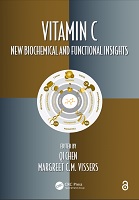Chapter 11 Vitamin C and the Brain
Proposal review
| dc.contributor.author | Hoffer, Leonard John | |
| dc.date.accessioned | 2023-08-10T12:19:29Z | |
| dc.date.available | 2023-08-10T12:19:29Z | |
| dc.date.issued | 2020 | |
| dc.identifier.uri | https://library.oapen.org/handle/20.500.12657/75335 | |
| dc.description.abstract | The brain requires vitamin C to metabolize fuel substrates and synthesize neurotransmitters, regulate their release, and modify their actions. Vitamin C also protects the brain from oxidative damage. Clinical studies do not provide strong evidence that vitamin C deficiency directly impairs brain function but rather suggest that the fatigue, mood disturbance, and cognitive dysfunction sometimes associated with vitamin C deficiency are due to peripheral tissue damage, with possibly an exaggerated emotional response to it. Severe brain injury drastically depletes the cerebrospinal fluid of vitamin C; clinical trials of high-dose intravenous vitamin C are strongly warranted for this condition. The very limited clinical trial evidence available does not demonstrate that vitamin C supplementation slows the progression of dementia or improves clinical outcomes after an acute ischemic stroke. Hypovitaminosis C is common in people with severe mental illness; it should be treated. A few clinical trials have been carried out of low-pharmacologic doses of vitamin C (alone or with other nutrients) as adjunctive therapy in patients with chronic stable schizophrenia or depression, with inconsistent results. There is plausible but inclusive evidence that continuous supplementation with a combination of several micronutrients, including vitamin C, may have cognitive benefits in some people even if they lack diagnosed vitamin deficiencies. | en_US |
| dc.language | English | en_US |
| dc.subject.classification | thema EDItEUR::M Medicine and Nursing::MK Medical specialties, branches of medicine::MKG Pharmacology | en_US |
| dc.subject.classification | thema EDItEUR::P Mathematics and Science::PS Biology, life sciences::PSD Molecular biology | en_US |
| dc.subject.classification | thema EDItEUR::P Mathematics and Science::PS Biology, life sciences | en_US |
| dc.subject.other | Antioxidants, Ascorbic Acid, Infectious Disease, Intravenous Ascorbate, Vitamin C, acute sepsis, cancer treatment, infectious disease treatment, stem cell transplantation | en_US |
| dc.title | Chapter 11 Vitamin C and the Brain | en_US |
| dc.type | chapter | |
| oapen.identifier.doi | 10.1201/9780429442025-11 | en_US |
| oapen.relation.isPublishedBy | 7b3c7b10-5b1e-40b3-860e-c6dd5197f0bb | en_US |
| oapen.relation.isPartOfBook | b5f7db67-fe9c-4e84-b587-54aa1b8117c0 | en_US |
| oapen.relation.isFundedBy | a9bd203e-2329-457e-a93c-b053a8e62b88 | en_US |
| oapen.relation.isbn | 9781138337992 | en_US |
| oapen.relation.isbn | 9781032175256 | en_US |
| oapen.imprint | CRC Press | en_US |
| oapen.pages | 27 | en_US |
| peerreview.anonymity | Single-anonymised | |
| peerreview.id | bc80075c-96cc-4740-a9f3-a234bc2598f1 | |
| peerreview.open.review | No | |
| peerreview.publish.responsibility | Publisher | |
| peerreview.review.stage | Pre-publication | |
| peerreview.review.type | Proposal | |
| peerreview.reviewer.type | Internal editor | |
| peerreview.reviewer.type | External peer reviewer | |
| peerreview.title | Proposal review | |
| oapen.review.comments | Taylor & Francis open access titles are reviewed as a minimum at proposal stage by at least two external peer reviewers and an internal editor (additional reviews may be sought and additional content reviewed as required). |

